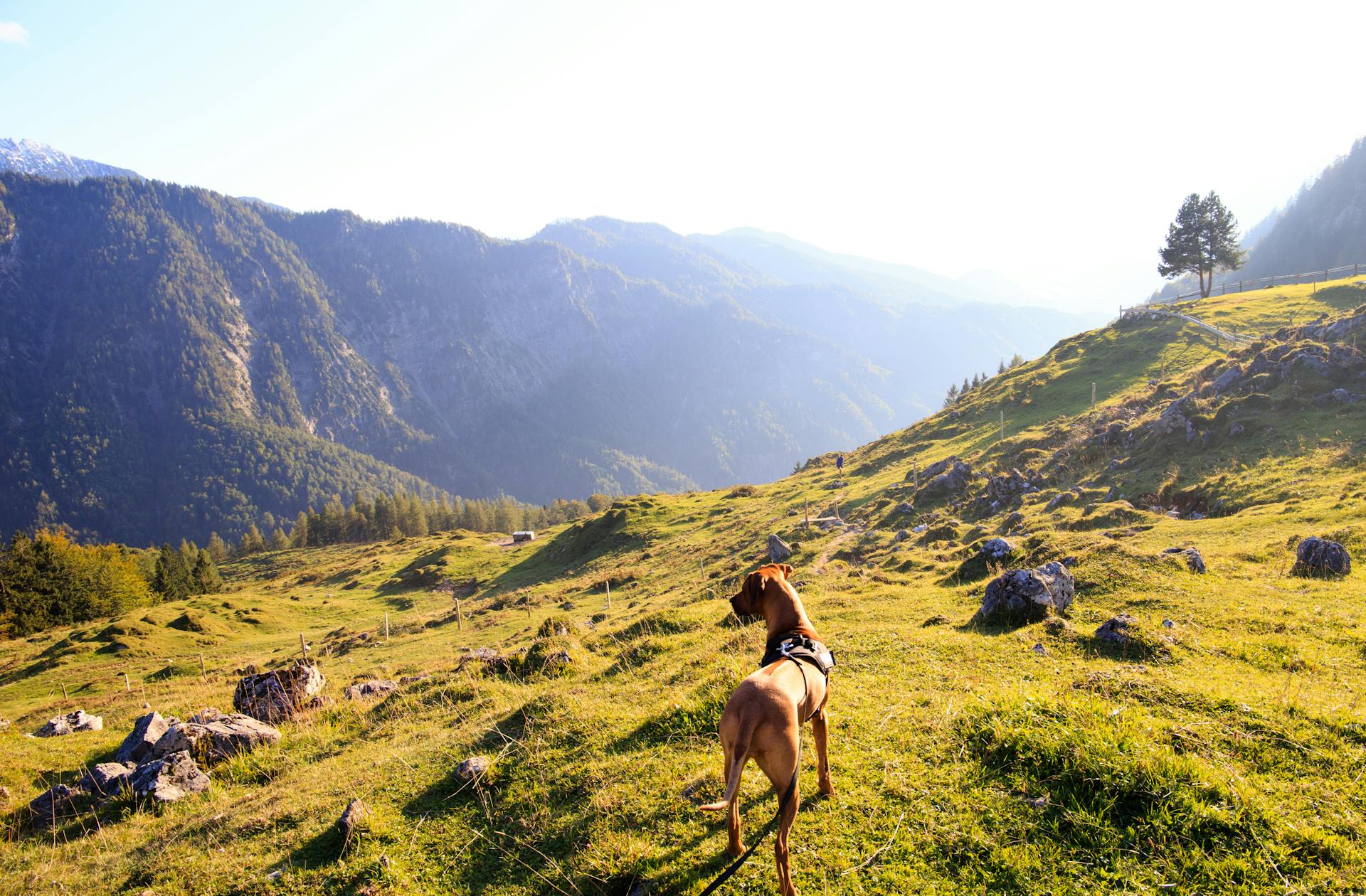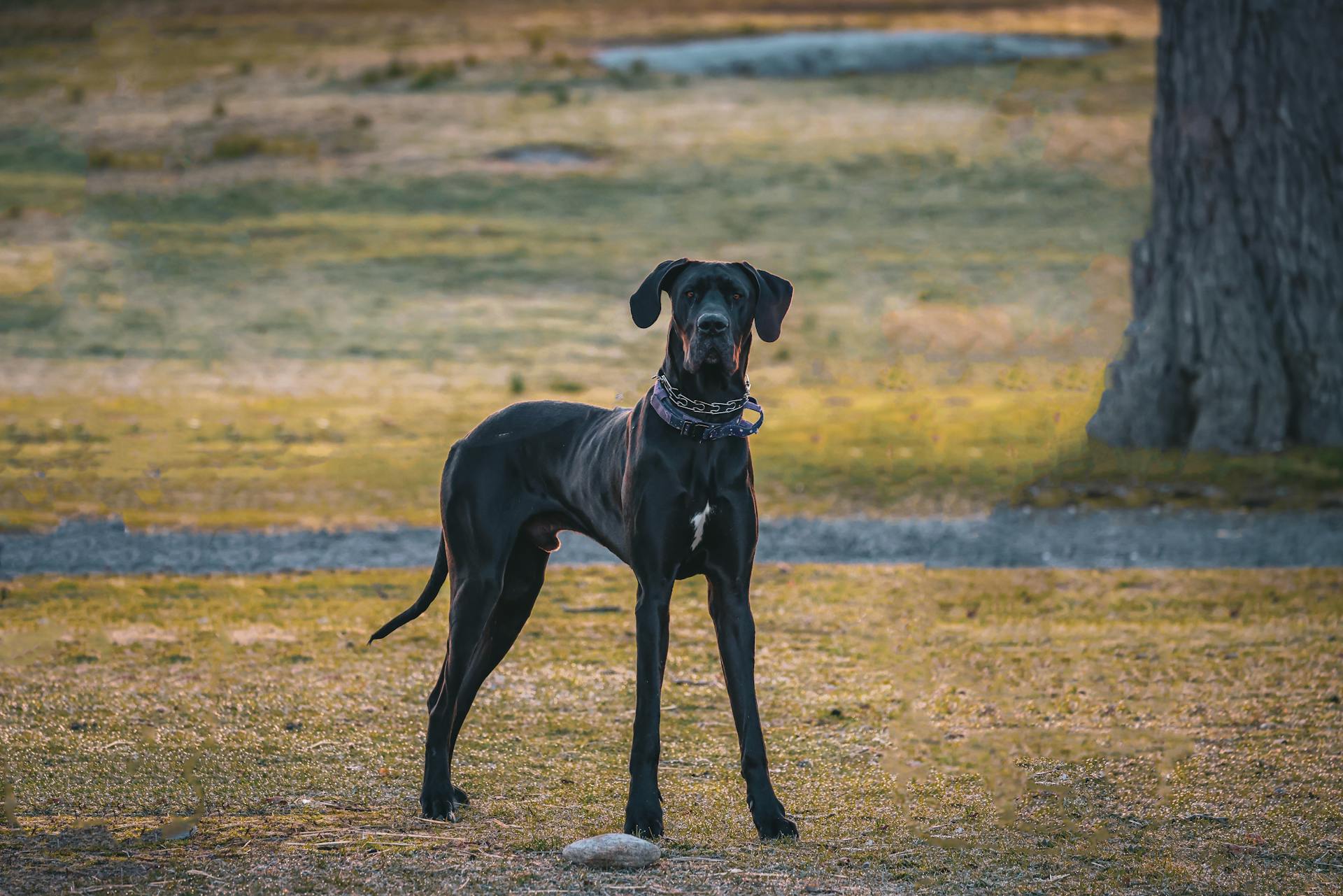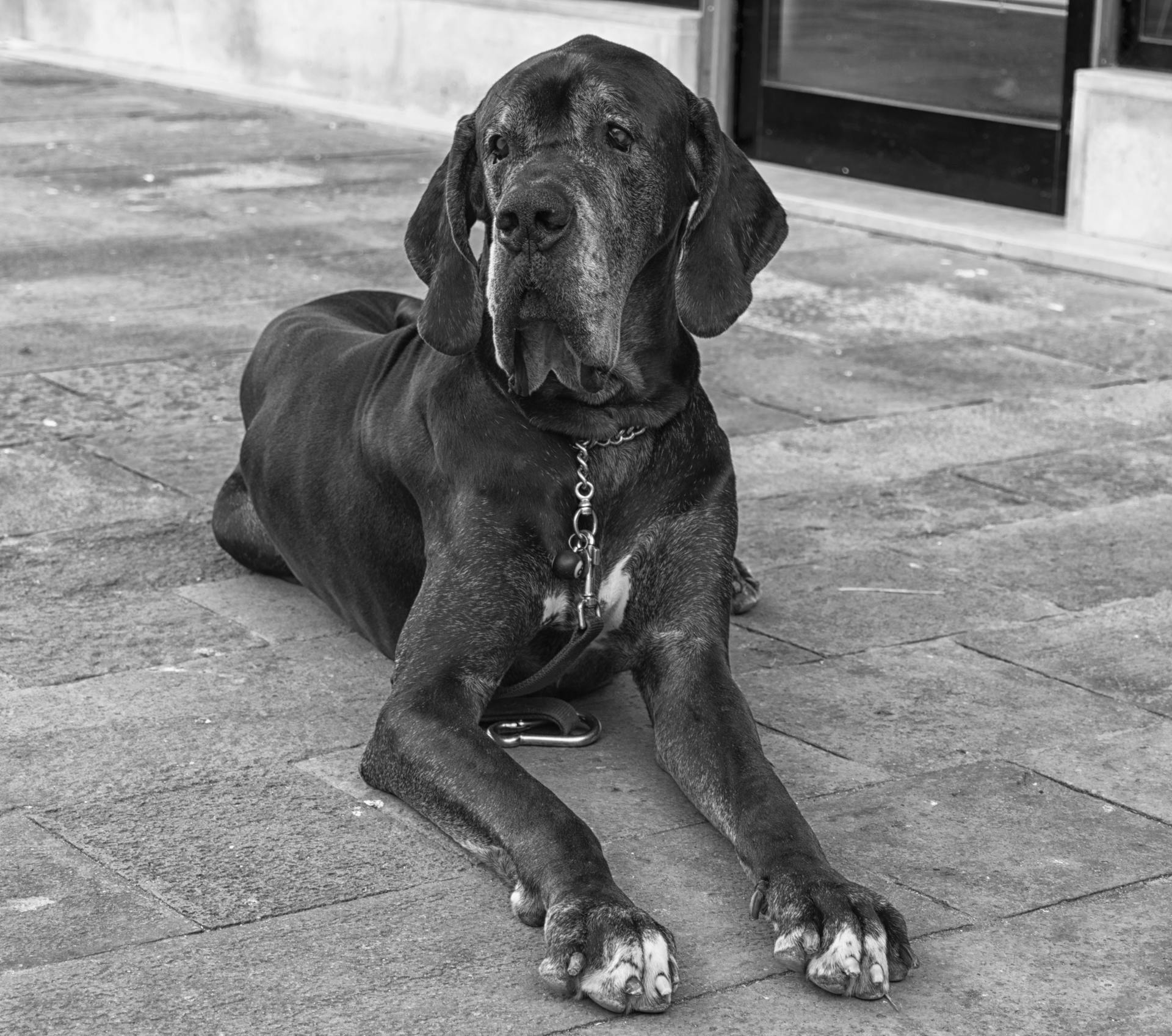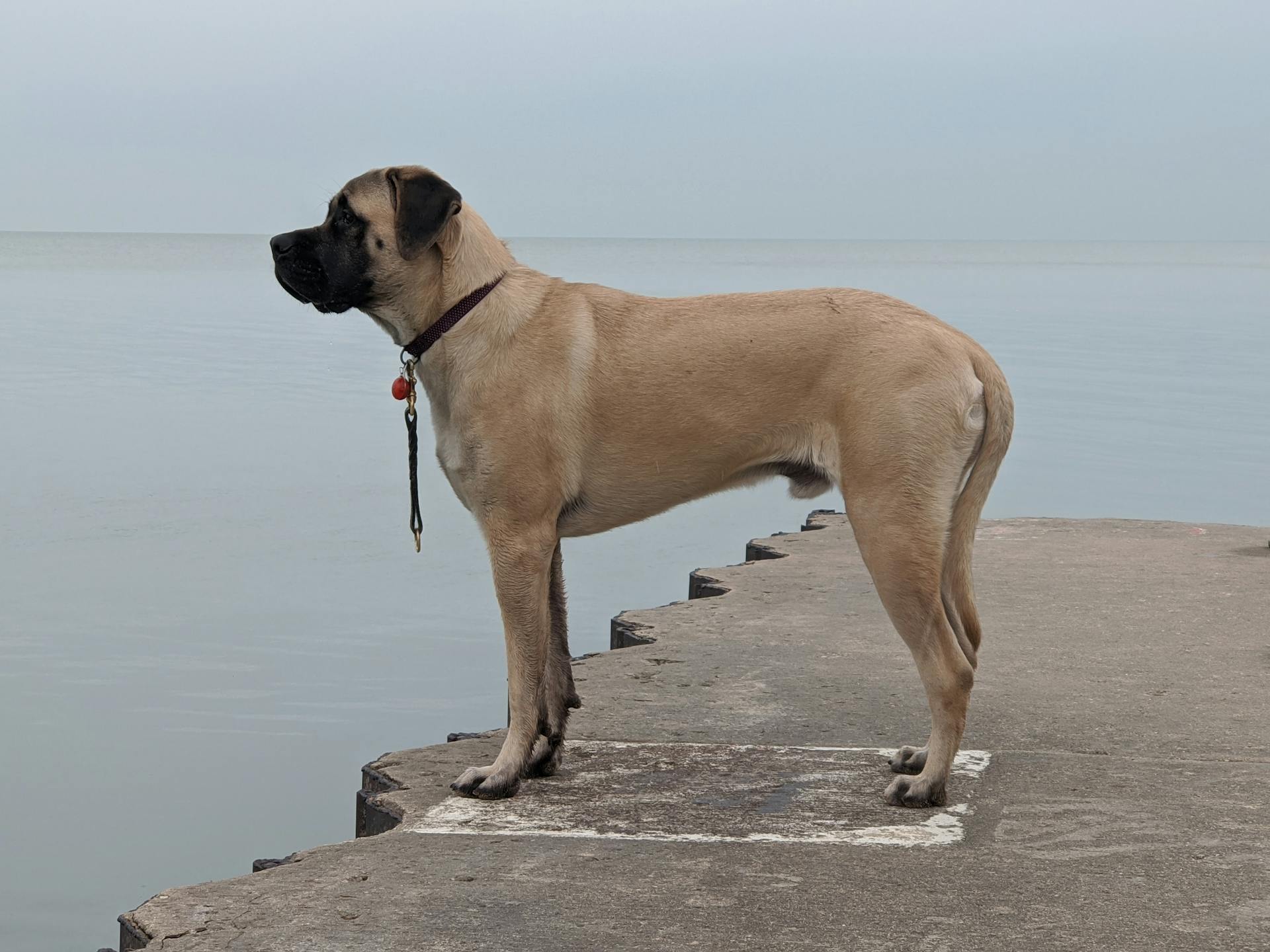
The English Mastiff Great Dane mix, also known as a Mastiff Dane or Daniff, is a giant breed that's often misunderstood.
This massive dog can weigh between 120-200 pounds and stand as tall as 30 inches at the shoulder.
They're known for their gentle nature, but it's essential to remember that they're still a powerful breed that requires careful training and socialization.
Their short coats require minimal grooming, but their large size means they need regular exercise to stay healthy and happy.
Expand your knowledge: English Pointer Mix Dog
Health and Maintenance
The English Mastiff Great Dane mix, also known as the Daniff, is a relatively low-maintenance breed when it comes to grooming. They shed very little and only need brushing with a pin brush around once a week.
Their smooth coat requires minimal bathing, but if your Daniff puppy inherits the wrinkles of the Mastiff, you'll need to wipe between them daily with a damp washcloth to prevent bacterial infections.
Daniffs have big teeth that need to be cleaned two to three times a week to prevent tartar buildup. Regular ear cleaning and nail trimming are also essential.
As a large breed, Daniffs are prone to certain health issues, including hip dysplasia, bloat, and cancer. It's crucial to keep up with regular veterinary checkups and consider pet insurance to cover potential medical expenses.
Some common health problems in Daniffs include bloat, hip/elbow dysplasia, cancer, and heart issues. Regular check-ups and a healthy lifestyle can help mitigate these risks.
A Daniff's lifespan can range from 6 to 12 years, but they are susceptible to various health conditions, including hip and elbow dysplasia, bloat, cancer, heart problems, and skeletal issues. Feeding high-quality dog food specifically geared towards large breed dogs can help with their development.
Here are some essential health and maintenance tips for your Daniff:
- Brush their coat once a week with a pin brush
- Wipe between wrinkles daily (if present)
- Clean their teeth 2-3 times a week
- Check and clean their ears as needed
- Trim their nails regularly
- Feed high-quality dog food specifically for large breed dogs
- Keep up with regular veterinary checkups
Care and Feeding
Taking care of your English Mastiff Great Dane mix requires regular veterinary checkups to detect any health issues early on. Your vet will create a care routine for your dog.
Oral health is crucial for your Daniff, so brush their teeth daily to prevent issues. Since they have big, floppy ears, check them daily to ensure there isn't any debris building up and clean them as recommended by your vet. Nail trims are recommended to be done once or twice per month.
A daily 30-minute walk and playtime with a variety of toys will help keep your Daniff happy and healthy. Be sure to provide plenty of toys that will occupy and stimulate their brain to prevent boredom and destructive behaviors.
Here's a quick guide to feeding your Daniff:
To prevent bloat, feed your Daniff smaller meals more often and avoid exercising them straight after meals. Also, consider using a slow feeder to prevent them from eating too quickly.
Feeding
Feeding your Daniff requires attention to detail to ensure they get the nutrients they need to thrive.
You should feed your Daniff a high-quality dog food specifically formulated for large and giant breeds, with protein as the main ingredient.
Their size means they'll eat significantly more than smaller breeds, so keep an eye on their food intake to avoid overfeeding and obesity.
Daniff puppies should be fed four meals a day, while adults can be reduced to three meals per day.
A slow feeder can help prevent them from eating too quickly, which can increase the chance of bloat.
To prevent bloat, feed them smaller meals more often, and avoid exercising them straight after meals.
Regular fresh and clean water should be provided, and consider adding some canned canine food to their diet to add variety.
However, be sure to cut down on the quantity of dry food to avoid overfeeding.
It's essential to monitor their weight and adjust their diet accordingly to prevent joint issues and other health problems.
Care and Feeding
Regular veterinary checkups are a must for your Daniff, as they can help detect any health issues early on. Your vet will create a personalized care routine for your dog.
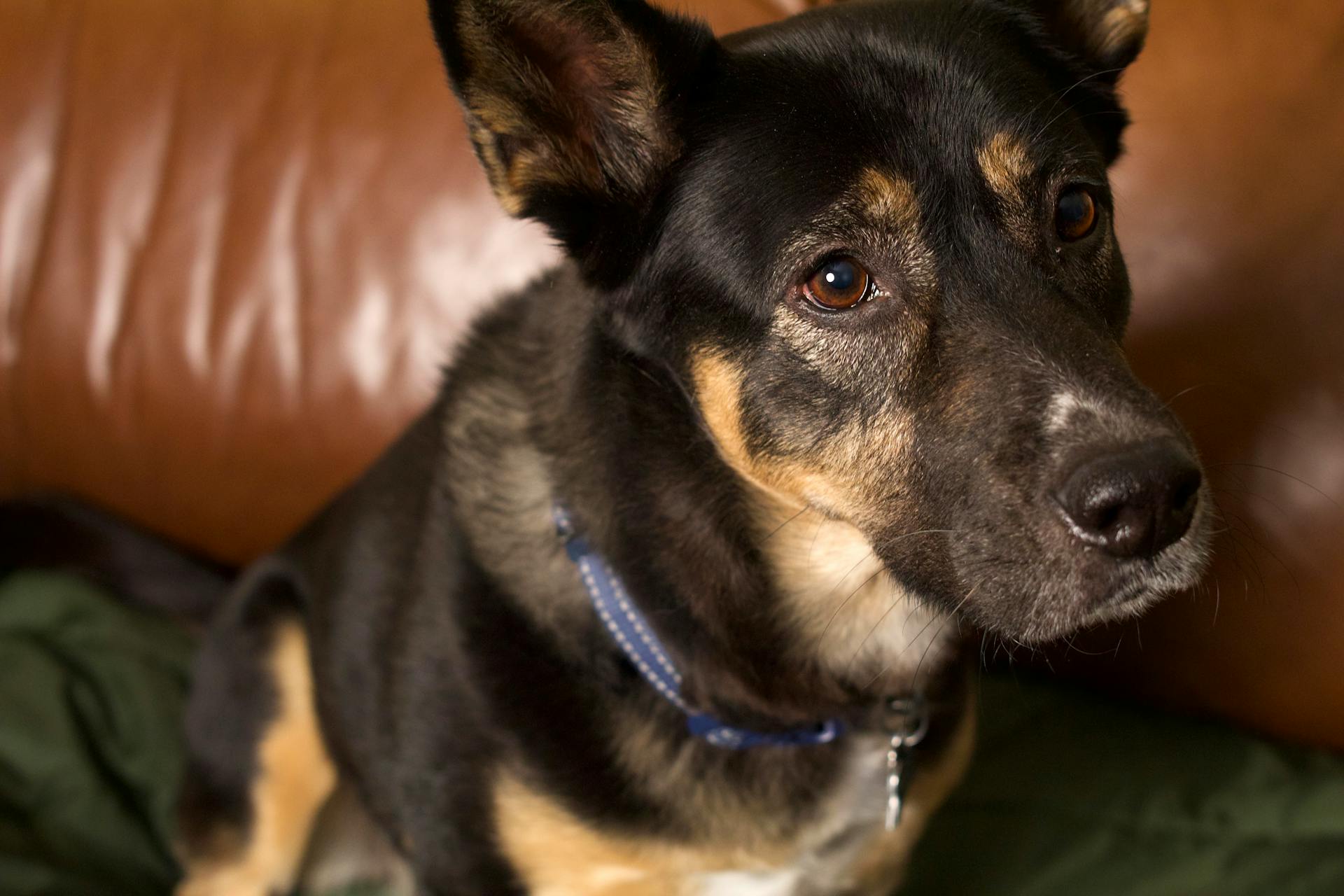
Daily teeth brushing is a must for every dog, including Daniffs. This will help prevent any oral health issues. Larger breed dogs like Daniffs tend to have fewer issues with their teeth.
Daniffs are prone to hip dysplasia and joint issues, so keeping your pup at a healthy weight is crucial. This will help reduce the stress on their joints.
A daily 30-minute walk and some playtime with toys will keep your Daniff happy and healthy. It's also essential to provide a variety of toys to keep their brain stimulated and prevent boredom.
Nail trims are recommended to be done once or twice a month. If you're unsure about how to trim your Daniff's nails, a groomer or veterinarian can help.
Here are some daily care tasks to keep in mind:
- Brush your Daniff's teeth daily
- Check their big, floppy ears daily for any debris
- Trim their nails once or twice a month
- Take them for a 30-minute walk daily
Remember, Daniffs can be lazy, so they might not always be up for a walk. But with consistent exercise and mental stimulation, they'll stay happy and healthy.
Grooming and Appearance
The Daniff's grooming needs are quite straightforward. They have a short, smooth coat that sheds very little.
Their short coat makes them a great choice for those who don't want to deal with a lot of dog hair. However, this also means they need regular brushing to prevent matting. Brushing should be done once a week, or more often during shedding season.
They'll only need bathing when necessary, and their short fur makes grooming a breeze. But, if your Daniff inherits the wrinkles of the Mastiff, you'll need to wipe between them daily with a damp washcloth to prevent bacterial infections.
Their big teeth will need to be cleaned two to three times a week to prevent tartar buildup. You'll also need to check and clean their ears when necessary and trim their nails regularly.
Breed Appearance
The Daniff breed is a large crossbreed, reaching up to 35 inches tall and weighing a whopping 150 pounds.

Their muscular build is quite impressive, with a large head and floppy ears.
They often resemble the Great Dane, but due to the Mastiff parent breed, they can be rounder and thicker.
The Daniff's gait is agile, though not quite as elegant as the Great Dane's.
Their short fur comes in various colors, including brindle, fawn with a black mask, black, harlequin, and mantle.
Coat Color and Grooming
The Daniff's coat is a beautiful aspect of its appearance, and it comes in a variety of colors and patterns.
The most common colors include fawn, black and white, brindle, and even two unique patterns called merle and harlequin.
Their short coats are a great advantage, as they shed very little, but you'll still need to brush them regularly.
Brushing is usually performed once or twice a week, making it a relatively low-maintenance task.
However, the Daniff's short coat means they can't tolerate very cold weather, so they may need a doggy jacket in winter.
Their short coats also mean they're not the best choice for those with allergies, as they do shed to some extent.
On the plus side, the Daniff's short coat makes grooming a breeze, and they don't drool as much as their parent breeds.
Temperament and Behavior
The Daniff is a gentle giant, known for being loyal and protective, making them a wonderful companion for families.
They are very affectionate with their family and great with children, but it's essential to supervise interactions between Daniffs and young kids due to their clumsy nature.
Despite their intelligence, Daniffs can be slow to train, requiring persistence and positive reinforcement.
Socialization is key to helping your Daniff become a well-behaved and happy dog, especially when it comes to interacting with other animals.
Daniffs have a strong protective instinct, making them excellent guard dogs, but they can also be territorial and may exhibit aggression if not properly trained.
With consistent education and loving attention, you can prevent unwanted barking and help your Daniff become a loyal companion.
Daniffs have an excellent memory and can be vindictive, but those who treat them with respect will find a loyal friend.
Their low prey drive makes them less likely to chase smaller animals, but their large size requires careful training to ensure they listen to commands.
Training a Daniff puppy requires patience, firmness, and consistency, and starting early is crucial to developing good behavior.
Daniffs are friendly and adaptable, thriving in households with large families or solo owners, but close supervision is still necessary, especially around young children.
Ownership and Responsibilities
As you consider bringing an English Mastiff Great Dane mix into your family, it's essential to think about the ownership and responsibilities that come with this breed. This mix can grow up to 30 inches tall and weigh between 120-200 pounds, making them a large and powerful dog.
They require regular exercise, including daily walks and playtime, to stay happy and healthy. A 30-minute walk is a good starting point, but be prepared to increase the duration as they grow.
Their short coats require minimal grooming, but their drooling can be a challenge. Be prepared to clean up after meals and provide regular dental care to prevent tartar buildup.
Remember, with great size comes great responsibility, and this breed needs a committed owner who can provide the necessary care and attention.
Breed History
The Daniff is a relatively new crossbreed, believed to have originated in North America in the late 20th century.
The Great Dane, one of the Daniff's parent breeds, dates back to around 3000 BC and was once a fearsome hunter known as the Boar Hound.
The Mastiff, the other parent breed, is an equally giant and ancient breed that's believed to be a descendent of the molosser.
In 55 BC, Julius Caesar invaded Britain and was impressed by the Mastiff's ability to defend the island.
The Great Dane was recognized by the American Kennel Club in the Working Group in 1887, while the Mastiff was recognized in the same group in 1885.
As a mixed breed, the Daniff isn't recognized by the American Kennel Club.
Activity Requirements
As a Daniff owner, it's essential to provide your dog with plenty of exercise to maintain a healthy weight and prevent excessive chewing or barking.
Daniffs are fairly active dogs and need a lot of physical activity to stay happy and healthy. A large yard where they can run around and play is ideal, but you can also take them to the dog park or on a leisurely walk.
They'll usually be happy to snuggle up and cuddle after a playtime, so be prepared for some quality cuddle time at night.
To prevent boredom, keep your Daniff mentally stimulated with puzzle toys, which can help keep them engaged and active.
Owner Experiences
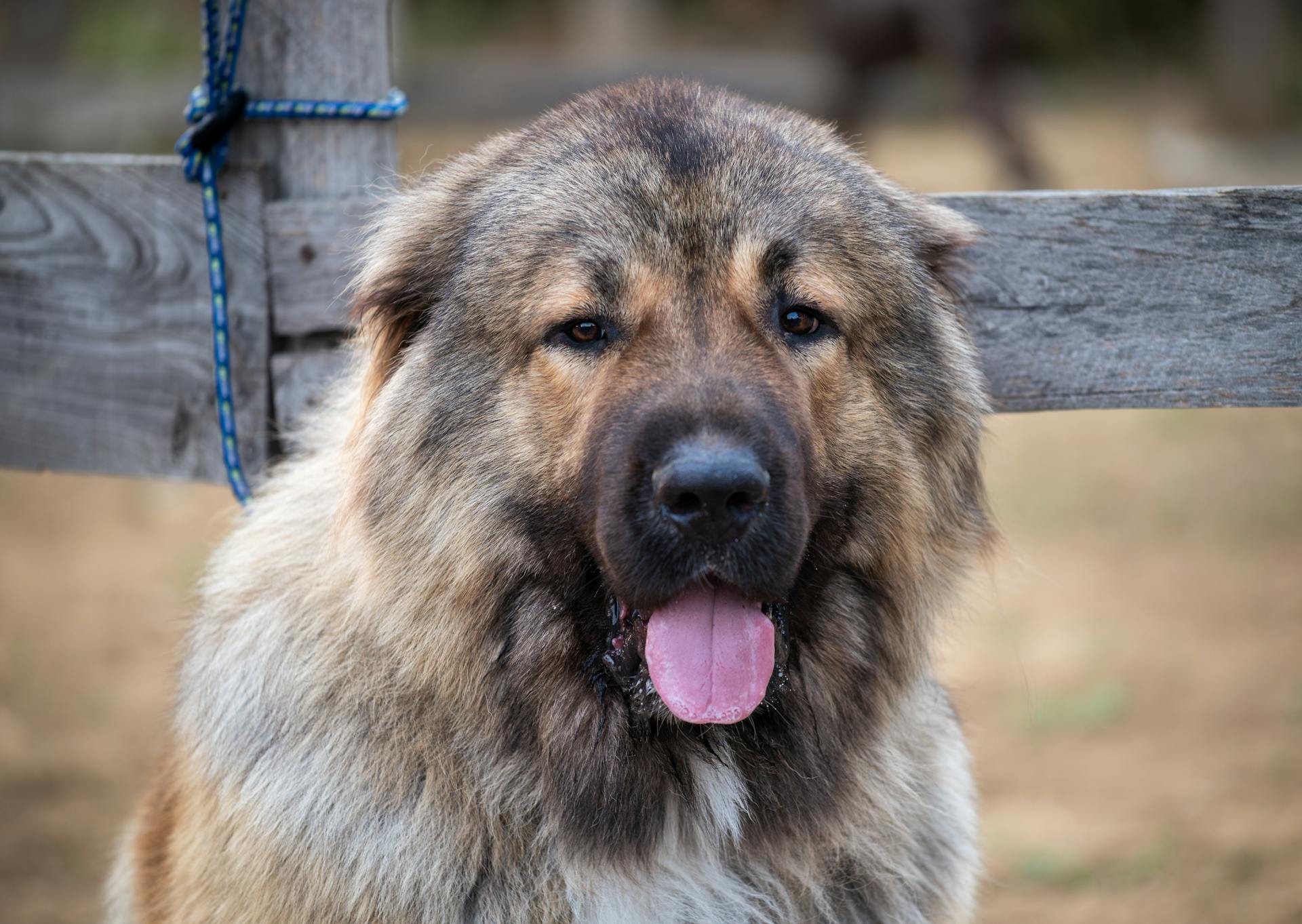
As a Daniff owner, you may be wondering about the specific needs of your pup. A Daniff pup needs to lay down while eating, just like Great Danes, to prevent choking hazards.
You'll want to make sure your Daniff has a comfortable place to eat and relax. Great Danes, as a breed, can be prone to bloat and choking, so it's essential to monitor their eating habits carefully.
Feeding your Daniff in a quiet, stress-free environment can help prevent anxiety and make mealtime a more enjoyable experience for both you and your pup.
Related reading: Great Dane Ear Cropping
Children and Pets
As you consider bringing a Daniff into your family, it's essential to think about how they'll interact with your kids. Daniffs can easily knock down a small child unintentionally if they become rambunctious, so an adult should always be present.
It's great that Daniffs love to play with people of all ages, but their intimidating size makes it crucial for children and adults alike to be aware of how strong these dogs are and know how to properly and safely interact.
If you're planning to introduce a Daniff to your household, it's essential to do so slowly and carefully, especially if you already have other pets. Daniffs are outgoing and can get along fine with other dogs and cats if they're socialized and well-trained early on.
Check this out: Dogs Water Mix
Rescue Groups
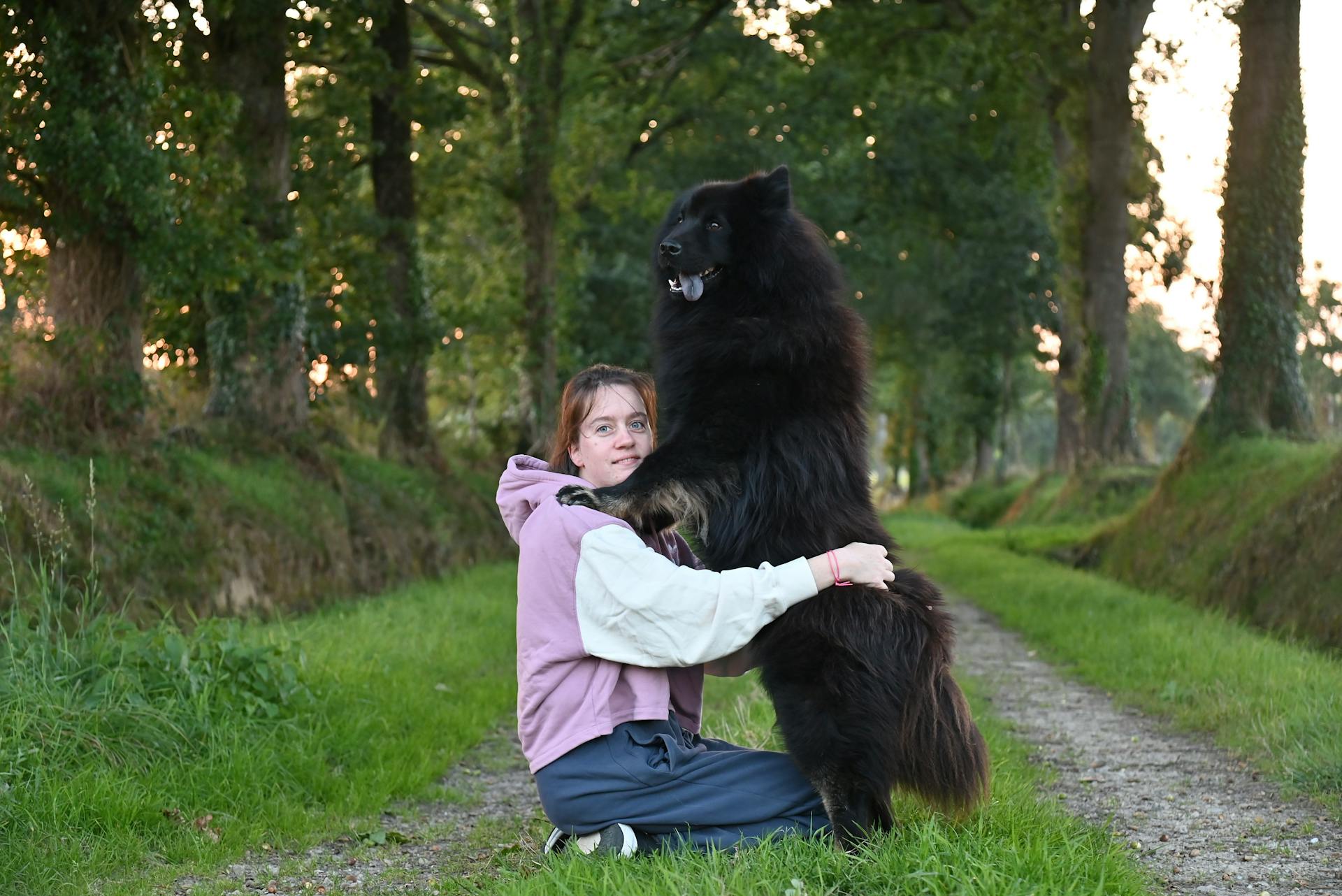
If you're considering bringing a Daniff into your life, you'll want to learn about rescue groups that can help you find one.
You may have a hard time finding a breed-specific rescue for Daniffs because they're a mixed breed. However, you can try contacting Great Dane or English Mastiff breed-specific rescues, as they often care for mixes as well.
Some rescues that cater to large or giant breeds might also be able to help you find a Daniff in need of a forever home.
Here are some rescues you can try:
- Gentle Giants
- Great Dane Rescue
- Mastiffs To Mutts Rescue, Inc.
Size
The Daniff is a massive dog, and its size is one of its most distinctive features. Both Great Danes and English Mastiffs are giant breeds, so you can expect a very large adult dog.
Males tend to be on the larger side, while females can be slightly smaller. Most Daniffs range in height from 27 to 33 inches. They can weigh anywhere from 115 pounds to about 190 pounds, depending on the gender of the pup and the sizes of the parents.
Frequently Asked Questions
How big is a Mastiff cross Great Dane?
The Daniff, a cross between a Great Dane and an English Mastiff, typically weighs between 115-190 pounds. This massive breed requires extra space and care due to its large size.
How much does a Daniff cost?
Daniff puppies typically cost between $600 to $1,500 from reputable breeders, with prices varying depending on the breeder and location. If you're interested in bringing a Daniff into your family, we can help you learn more about this unique breed.
Featured Images: pexels.com
